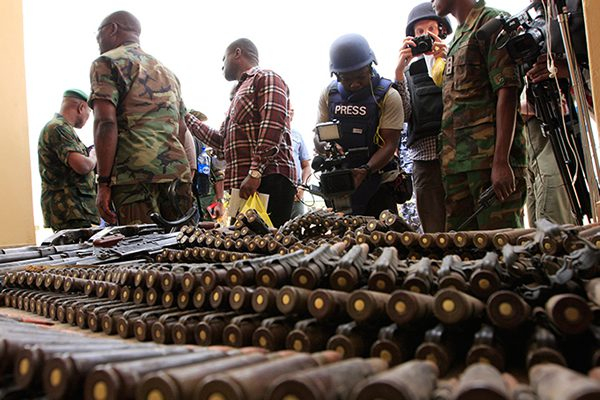The Defence Industries Cooperation of Nigeria (DICON) has announced that it has resumed the production of arms and ammunition after years of suspension, following a series of reforms and funding from the government and foreign partners.
DICON, the state-owned corporation responsible for the production and supply of defence equipment to the Nigerian military and other security agencies, had been facing operational and financial challenges that hampered its ability to meet the country’s defence needs.
However, according to its Director-General, Maj.-Gen. Aniedi Edet, DICON has undergone a transformation that has enabled it to restart its production and increase its output and quality.
Edet made the declaration in Jos last week when he visited Maj.-Gen. Abdusalam Abubakar, General Officer Commanding 3 Division of the Nigerian Army.
He said that DICON was implementing some reforms aimed at fulfilling its statutory mandates and satisfying its customers.
“Over the years, DICON has been doing its best to meet these needs, but people feel it should do more. We have resumed the production of ammunition which has been stalled for some time. As we speak, we are churning out a good batch of ammunition,” he said.
He added that DICON had supplied about four million rounds of ammunition to the Nigerian Army in January and was assembling some range of weapons that would enhance its operations.
Edet also attributed the revival of DICON to the signing of the DICON Bill into law by President Bola Tinubu in November 2023, which he said would enable the corporation to build a military-industrial complex with DICON as the hub.
“This will enable us to incorporate so many defence-related industries in Nigeria which have the potential and capability to meet the country’s defence needs. This simply means that DICON needs to build a robust partnership with relevant government agencies and organisations to achieve its mandate,” he said.
The DICON Bill, 2023, which was sponsored by the Chairman of the House of Representatives Committee on Defence, Babajimi Benson, repeals the previous DICON Act and introduces several reforms and innovations to the corporation.
The bill empowers DICON to operate and maintain subsidiaries and ordnance factories, establish a research and development institute, provide a regulatory framework for the defence sector, and attract private capital to facilitate production and innovation.
The bill also aims to make DICON more accountable, transparent, and efficient in its operations and management.
The signing of the bill comes at a time when Nigeria is facing various security challenges, such as insurgency, banditry, kidnapping, and piracy. The bill is expected to enhance the capacity and capability of the Nigerian military and other security agencies to combat these threats and protect the sovereignty and territorial integrity of the country.
The bill will also enable DICON to produce a wider range of defence products, such as weapons, ammunition, vehicles, uniforms, and equipment, and export them to other countries. The bill will also foster the development of local content and technology transfer in the defence sector, creating opportunities for local manufacturers, suppliers, and researchers.
The signing of the bill is the latest in a series of initiatives taken by President Tinubu to boost Nigeria’s defence industry. In September 2023, the president approved a $1 billion deal with India to modernize DICON’s facilities and increase its local production of defence equipment to 40% by 2027.
The deal will also provide DICON with the funding and expertise it needs to produce more sophisticated and advanced products, such as drones, missiles, and radars.
In addition, DICON has been collaborating with other countries and companies to produce and acquire new defence products. In January this year, leading US military firm, NEANY, agreed to establish advanced weapons production lines at the DICON facility.
The primary objective of this collaboration is to create assembly lines dedicated to manufacturing cutting-edge military equipment, such as drones, radars, and biometric systems, that can significantly contribute to Nigeria’s fight against insecurity.
DICON’s resumption of arms production is a welcome development for the country, as it will not only strengthen its defence capabilities, but also create jobs, generate revenue, and promote innovation.
In 2022, DICON and the Nigerian Army Vehicle Manufacturing Company (NAVMC) created the Alkali MRAP after leveraging on the experiences gathered by troops over the years on the battlefield. Both Nigerian defence companies had earlier designed the battle-proven Ezugwu MRAP which has seen several iterations over time. The company has also signed a Memorandum of Understanding (MOU) with the University of Ilorin to develop Composite materials for Armour plating for use in the production of military vehicles.





 العربية
العربية 简体中文
简体中文 繁體中文
繁體中文 Nederlands
Nederlands Français
Français Deutsch
Deutsch עִבְרִית
עִבְרִית Italiano
Italiano 日本語
日本語 한국어
한국어 فارسی
فارسی Português
Português Русский
Русский Español
Español Türkçe
Türkçe Українська
Українська